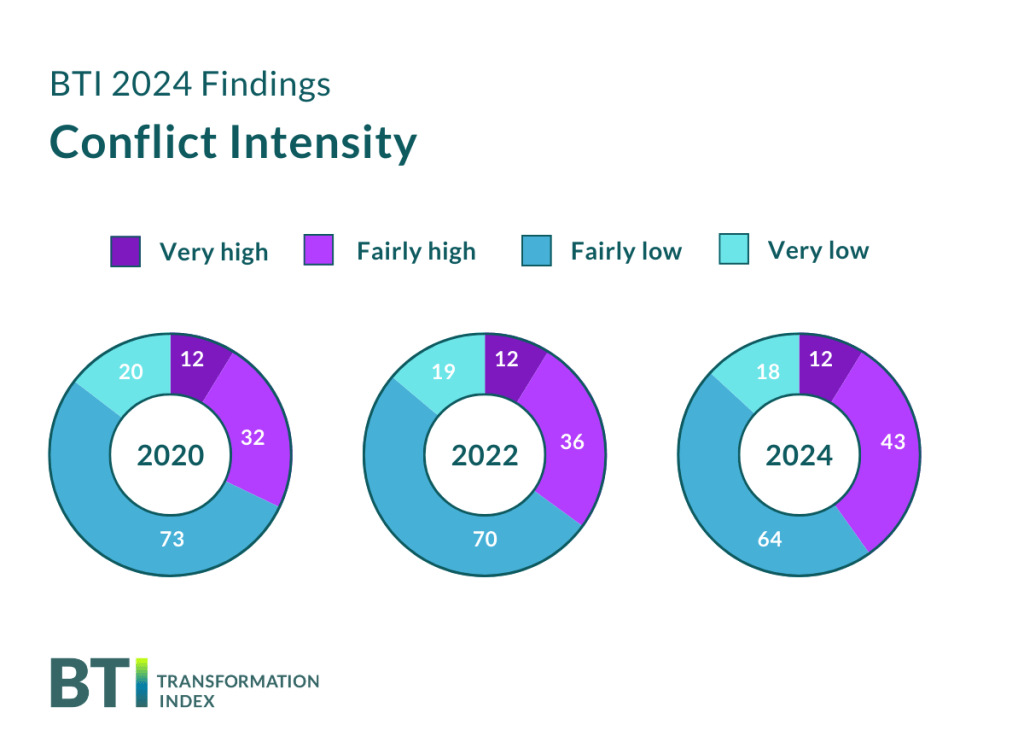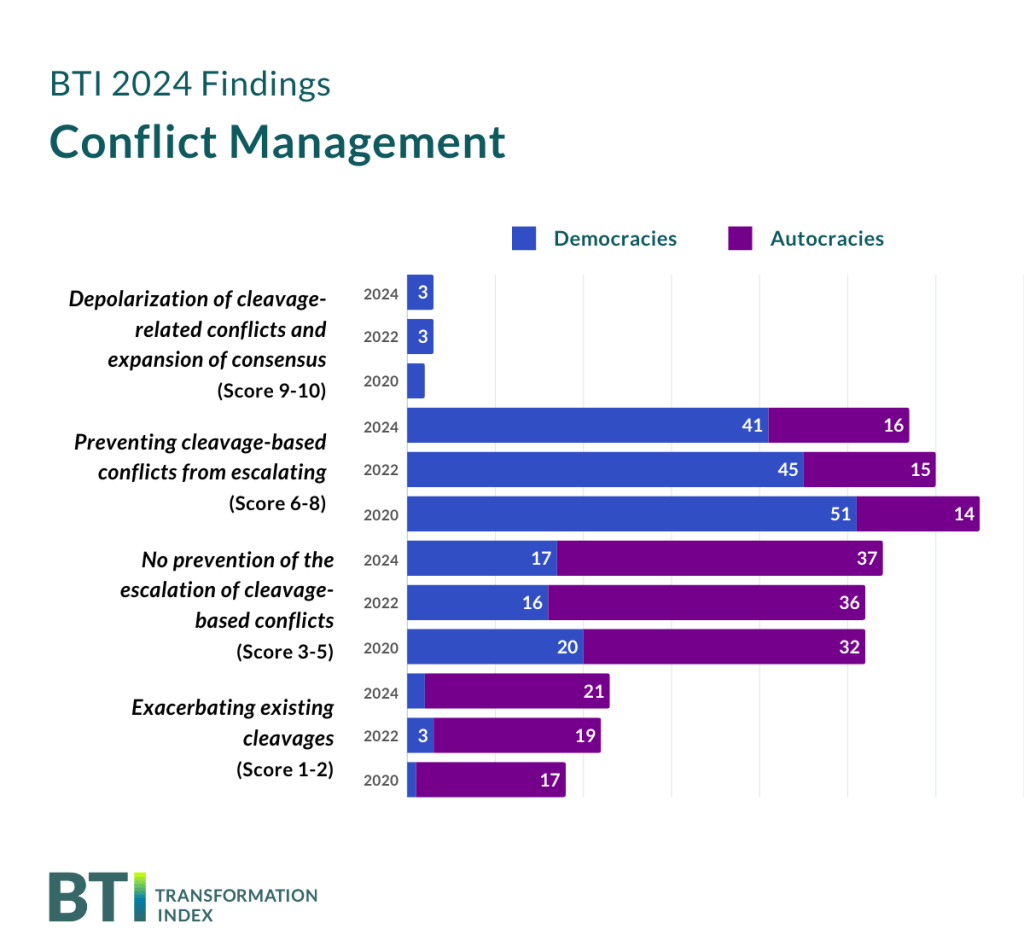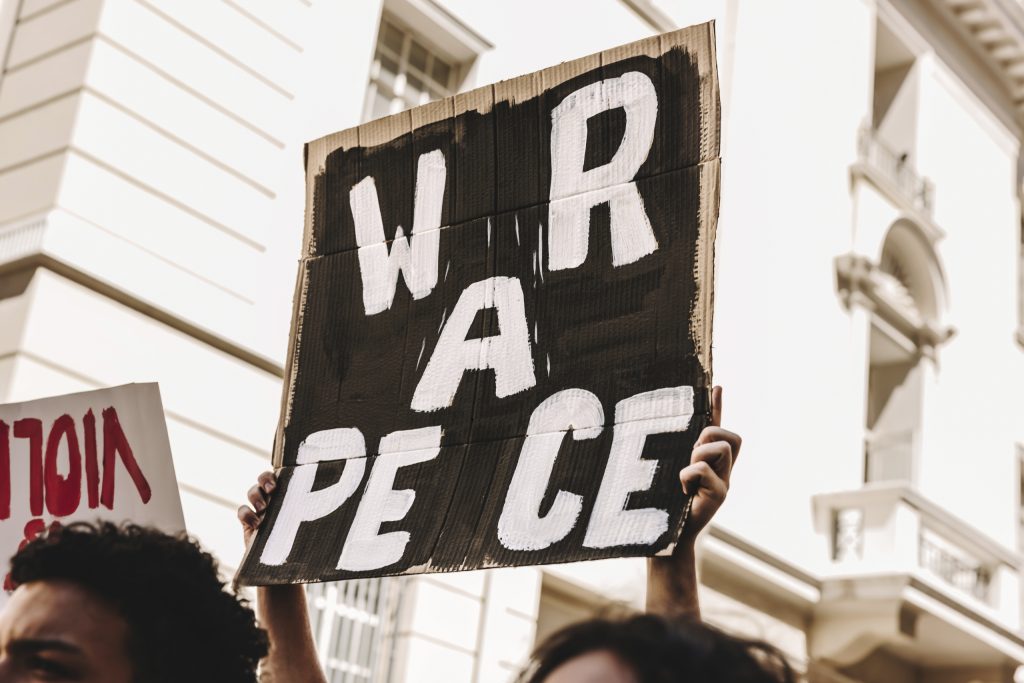Between Peace and Conflict: The Role of Good Governance
Characterized by escalating violence, 2024 continues the alarming trend of the recent past. While conflicts and the hardening of autocratic regimes have impeded democratic progress and transformation efforts in countries such as Belarus and Ethiopia, there are encouraging developments in countries such as Tanzania and Ukraine, where resilience and governance efforts have fostered hope. What is the critical role of good governance in fostering stability in transformation processes?
Since 2020, the world has witnessed a distressing rise in conflict and political instability. This is evidenced by the Uppsala Conflict Data Program (UCDP) and the Peace Research Institute Oslo (PRIO), revealing that 2021-2023 have been the most violent years since the end of the Cold War. Notably, 2023 marked a grim milestone, with the highest number of state-based conflicts since 1946, involving 59 conflicts across 34 countries. While the number of conflicts has increased in comparison to 2022, the number of countries affected by conflict has decreased (56 conflicts in 39 countries). What is glaring, however, is that conflicts are becoming more complex and multifaceted, with a greater number of actors involved.
Moreover, findings from the BTI 2024 also indicate an increase in global conflict intensity by 0.29 points in comparison to 2020 (average value 2020: 4.77; 2024: 5.06). It is measured by the seriousness of political, social, ethnic, and religious conflicts.

Source: BTI 2024
At the same time, the capacity of states to manage and depolarize structural conflicts and cleavages has diminished, with an average decline of 0.30 points (average score 2020: 5.21; 2024: 4.91). While this negative development reflects a global trend, it should be emphasized that democracies possess a greater capacity to manage conflicts and societal divisions, whereas autocracies are more prone to their exacerbation and instrumentalization (see figure 2). Both indicators constitute components of the BTI analysis on the governance performance of states, which assesses the quality of political management and the effectiveness with which political decision-makers facilitate transformation processes.

Source: BTI 2024
But what is the role of governance in fostering peaceful societies and preventing conflict? The quality of governance is of great importance in de-escalating tensions, responding to the needs of the civilian population, building consensus, and promoting social and economic development. States with effective governance are better equipped to resolve conflicts, whereas poor governance has the opposite effect, contributing to further polarization and violence. It is also a significant factor contributing to weak institutions, corruption and a lack of accountability, all of which fuel deeply rooted conflicts and hinder progress toward peace and democracy.
Autocracies are more prone to poor governance performance and higher conflict intensity
Findings from the BTI show a strong correlation between conflict intensity and governance quality, revealing that autocracies not only exhibit weaker governance performance but are also more likely to experience heightened levels of conflict intensity. Specifically, 66% of all autocracies analyzed by the BTI (49 of 74 states) exhibit weak or failed governance, while this applies to only four of 63 democracies (Bosnia and Herzegovina, Brazil, Hungary, Lebanon).

Source: BTI 2024
This correlation can be attributed to the inherent characteristics of autocracies, which are typically less responsive to societal needs, more prone to repression, and more likely to exacerbate conflicts and tensions. Unsurprisingly, deeply conflict-ridden countries such as Syria, Yemen, Myanmar, Sudan, and South Sudan not only experience extremely high levels of conflict intensity but also exhibit exceptionally poor or failed governance. While this situation remains concerning and has seen little change in recent years, there are cases where negative developments have only recently become more pronounced.
Such is the case in Belarus, where massive anti-government protests erupted after the 2020 elections and were brutally suppressed by the regime. President Lukashenko has resorted to the implementation of repressive and populist measures to maintain his position of power, has eliminated the opposition, and has aligned himself with Russia in its aggression against Ukraine. The widespread repression against the civilian population and the division by the regime has significantly escalated conflict intensity, rising from fairly low levels in 2020 (score 3) to fairly high levels by 2024 (score 7). Additionally, the quality of governance, as measured by the BTI Governance Index, has deteriorated substantially, shifting from weak governance in 2020 (score 3.71) to a failed governance classification in 2024 (score 2.22).
In Ethiopia governance performance is constrained by ongoing ethnic and political conflicts, as well as the impact of the Tigray War (2020 to 2022). The conflict has not only undermined the progress made through reforms initiated in 2018 but also demonstrated the government’s inability to address the country’s core political challenges, including social, political and ethnic divisions, ethnic federalism and unresolved historical grievances. This is reflected in a sharp rise in conflict intensity, which has reached very high levels by 2024, alongside a significant decline in conflict management capacity, as political leadership has exacerbated existing and encouraged further divisions. The BTI Governance Index also shows an overall decline, with Ethiopia falling from moderate governance in 2020 (score 4.96) to weak governance in 2024 (score 4.15).
Improving governance through effective adjustments and political will
Despite the grim global trends, there are encouraging examples where good governance fostered resilience and stability even in the face of significant challenges. Good governance, as defined by the BTI, encompasses capable policy management, efficient and corruption-free leadership, the ability to build consensus while managing and defusing conflicts as well as reliable and, credible international cooperation. These elements provide the necessary conditions for sustainable development and peace to flourish, even in the context of adversity. While 36 countries analyzed by the BTI demonstrate good or very good governance performance, it is insightful to examine countries where governance has shown significant improvement in recent years despite facing considerable challenges.
In Tanzania, governance has significantly improved under the leadership of President Samia Suluhu Hassan, the country’s first female president. Between 2022 and 2024, the BTI Governance Index increased significantly, reflecting a shift from weak (score 4.43 in 2022) to moderate governance (score 5.34 in 2024). This can be attributed to the unexpected leadership shift in 2021. Since then, Hassan has reversed many of her predecessor’s policies and announced democratic and economic reforms. These efforts have contributed to a liberalization of the political climate, a reduction of internal conflict from moderate (score 4 in 2022) to low levels (score 3 in 2024) and improved conflict management to the point where conflicts are now prevented. Although deep religious or ethnic cleavages do not exist, political and economic disputes flare up and tensions with Zanzibar remain. However, violence is widely rejected across civil society.
One striking example whereby improved governance has been achieved in the context of significant challenges is that of Ukraine, confronted with the ongoing Russian aggression. Since becoming an EU candidate in 2022, Ukraine has prioritized reforms in key areas, including the judiciary, media, and anti-corruption initiatives. These reforms contributed to notable advancements in the BTI Governance Index, with a 0.52-point increase between 2020 and 2024, placing Ukraine in the category of countries exhibiting good governance. The government has managed to reduce societal cleavages, with a noticeable shift in attitudes toward Russia, as the war has unified the population in the face of external aggression. The BTI 2024 country report reveals that the intensity of internal conflict has reduced by 7 points between 2020 and 2024, highlighting the country’s ability to stabilize despite external threats. Since President Zelensky’s election in 2019, there has been a weakening of anti-democratic actors, increased civil society participation and the implementation of conciliatory rhetoric aimed at addressing domestic cleavages.
While these examples may not represent flagship models of good governance and require further efforts for improvement and change, they show that political will and targeted measures can pave the way for better administration and political management.
Good Governance: A Cornerstone of Stability and Resilience
The presented cases illustrate that improving governance performance is not only possible but necessary for fostering stability and peace, even in challenging contexts. In contrast, the absence of good governance often exacerbates instability and conflict intensity, as demonstrated by the experiences of autocratic regimes. States with robust governance consistently maintain greater stability, even in times of crisis and uncertainty. Autocracies such as Belarus and Ethiopia show poor governance performance and higher conflict intensity. Ukraine, as a democracy, stands for impressive adjustments to conflict while Tanzania, classified as a moderate autocracy, signals improvement in governance performance, and therefore in its responsiveness to conflict.
For fragile states, systemic reforms, the establishment of effective institutions, and the strengthening of civil society are pivotal in breaking cycles of instability. While multilateral organizations, such as the UN or the IMF, can play a pivotal role in supporting these efforts through governance-focused programs, the success of such initiatives depends on local ownership to ensure reforms are context-specific and sustainable.
Good governance thus emerges as a cornerstone for stability and more peaceful societies. By addressing root causes of conflict, fostering social cohesion, and enhancing resilience, also regarding external shocks and spillover effects of regional crises, it lays the foundation for sustainable peace and development. In an increasingly volatile world, efforts to improve governance are indispensable as both a proactive and preventive strategy for stability and prosperity.

This is a very insightful article. Thank you for sharing.